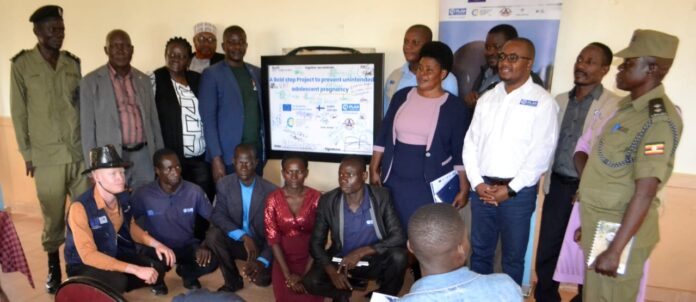Communities and local governments across Uganda are facing a renewed and urgent call to action: take “Bold Steps” to ensure every child, especially girls, can enroll, stay, and successfully complete their entire school cycle. This critical appeal was made by the European Union Delegation to Uganda and Plan International Uganda upon the recent closure of the impactful “Bold Steps Project.”
The project, which has been operating in Buyende and Kamuli Districts since 2023, was launched with the ambitious goal of empowering adolescent girls and young mothers to take charge of their futures, primarily through the prevention of unintended teenage pregnancies. Supported jointly by the European Union, Plan International Finland, and the Ministry of Foreign Affairs Finland, the “Bold Steps” initiative has made a life-changing impact on 17,671 direct participants and an estimated 28,489 indirect beneficiaries in the two districts.
Speaking at the closing ceremony at Kyemba Gardens, Lazarus Mwale, Director of Programs – Strategy Execution and Implementation at Plan International Uganda, emphasized the dual nature of the event. “As we celebrate the milestones achieved under this project, we also reflect and make renewed commitment to ending child marriages and teenage pregnancies and make bold steps to provision of safe, gender responsive and youth friendly services,” Mwale urged.
Mwale commended the adolescent girls and boys who, through the project, made informed decisions to shape better futures. He highlighted a significant achievement: the toll-free call center, which received over 3,000 calls in the past 12 months, indicating a clear demand for safe, youth-friendly services. “The design and implementation of this project is in line with Plan International Uganda’s Country strategic goal of ensuring that children and youth, especially girls, develop their full potential in communities that promote their rights and gender equality,” Mwale affirmed.
The European Union delegation, led by Elizabeth Ongom, delivered a stark message, calling for a “reactivation of parenting.” Ongom lamented that many parents have abdicated their responsibilities, outsourcing them to technology, social media, and schools. She pointed out the alarming reality where “parents are key promoters of defilement and other vices for economic gains,” stressing that “defilement is a crime but parents negotiate and perpetuate it, and these are issues beyond EU, NGOs, but to be dealt with at local government and duty bearers’ levels.”
The European Union further underscored the critical issue of girls’ re-entry and retention in school. Despite the government’s introduction of free universal education, school dropout rates remain stubbornly high, a challenge Ongom squarely placed on community responsibility. “Today is not an exit but a handover to the systems and communities with the mantle of continuity. Remain steadfast and supportive and sustain the positive practices and mindsets and build on this foundation to shift the narrative of unintended pregnancies so that we keep changing generations together,” Elizabeth urged.
Michael Kanaku, the Buyende District Chairperson, acknowledged the challenging reality from the local government perspective. He admitted that despite existing legislations, policies, and mechanisms to address sexual and gender-based violence, child marriages, and teenage pregnancies, the implementation of these policies remains weak.
“We can’t continue burying our heads in the sand but come to reality that these vices need bold steps and action,” Kanaku stated with candor. He revealed the grim statistic that “Buyende was ranked highest in defilement crime last year and our school completion rate is low,” signaling a significant awakening. The district is now committed to advocating for the development and adoption of a “School re-entry policy for pregnant girls and child mothers.”
Kanaku allayed fears that the project’s closure would leave a massive service gap, highlighting the strength of the “Bold Steps Project” in its collaborative approach with established service and local government structures, suggesting that “perhaps the only significant change will be funding.”
The profound impact of the project was vividly illustrated through compelling testimonies from young mothers. Nalongo, a 14-year-old mother of twins, shared her heartbreaking story of despair and stigma, nearly driven to take her own life. Through the “Bold Steps” project, she not only safely delivered her twins but has also courageously returned to school, now focused on becoming a nurse to help other girls understand their body changes early in life.
“It is like a life miracle that my twins and I owe to the Bold Steps project. My return to school is not just my victory but it is also an inspiration for other teenage mothers. Big and High Five to Plan International and European Union,” Nalongo exclaimed with tears of joy, embodying the very spirit of resilience and hope that the “Bold Steps Project” sought to inspire.
The call from the European Union and Plan International Uganda is clear: the success of the “Bold Steps Project” is a foundation, not a conclusion. It is now up to communities and local governments to carry the mantle, ensuring that every child, especially girls, can fully enjoy their rights and develop their potential without hindrance from harmful cultural norms and community vices.



